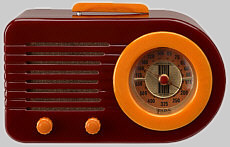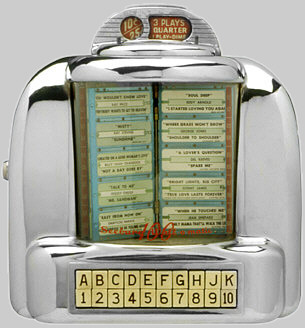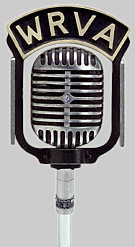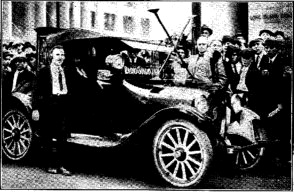PODcasts/MP3s, Internet streams, FM/SCA,
Last worked on: May 9th, 2025
You're at: https://57296.neocities.org/radio.htm
5/9/2025: * I've saved my old Radio page here, but am deleting quite a bit of obsolete material from this 5/9 version. (I still use a "flip phone". The digital world has passed me by.)
A few parting thoughts:
* PODcasts are the future of broadcasting --with or without well screened "call-ins" (if the show is live streamed).
* While content might be silently sent out via an FM station's SCA channel, distribution via MP3s and free or paid Internet subscriptions are more likely (IMHO).
* It's time to take a hard look at the costs of maintaining a maximum power FM broadcast signal --compared to simply live streaming and archiving its programs for downloads (manually or automatically updated).
* Few of us are privileged the quiet, uninterrupted life it requires to be sitting up at timely attention, in order to take in a program on a radio station's schedule: "quiet you guys --it's starting".
 *
The annoyance of paywalls around mainstream Internet news sources (NYT,
Washington Post) has (IMO) contributed to the growing impact of (unpaywalled)
PODcasts on our assorted grips on reality, events and developments.
*
The annoyance of paywalls around mainstream Internet news sources (NYT,
Washington Post) has (IMO) contributed to the growing impact of (unpaywalled)
PODcasts on our assorted grips on reality, events and developments.
![]()
 *
A person can get mighty news hungry in small towns
like mine, especially on the weekends. (Our household doesn't subscribe
to cable TV --$540/year --get out!) After Googling at length for downloadable
NPR
news PODcasts, it's my impression that they mostly
put out live-streaming --which is pretty much useless if one's life is
subject to interruptions (and that's pretty much how it is for most of
us). For a half-hour chunk of straight "global news", download the BBC's
PODcast at:
*
A person can get mighty news hungry in small towns
like mine, especially on the weekends. (Our household doesn't subscribe
to cable TV --$540/year --get out!) After Googling at length for downloadable
NPR
news PODcasts, it's my impression that they mostly
put out live-streaming --which is pretty much useless if one's life is
subject to interruptions (and that's pretty much how it is for most of
us). For a half-hour chunk of straight "global news", download the BBC's
PODcast at:
> https://www.bbc.co.uk/programmes/p02nq0gn/episodes/downloads
There's no "save link as", but it's real easy. Left click on "Download", you get a choice of standard or high fidelity, then it goes to your default download folder/directory. Below the first Global News offering is a plethora of news segment downloads from over the past 30 days. The voice clarity is excellent, even via the lower fidelity choice. Unfortunately, much of the news is delivered via interviewed overseas witnesses and journalists. I can understand their accents well enough with good headphones, but not by using a single earbud --as I bang around the house, the shop, or drive around town. (For several reasons here I usually need to keep "one ear peeled", especially while driving. Donations: the BBC is government funded and simply glad that you're in the audience.
* KPFK's PODcast archive service at:
--presents current and past PODcasts for some of the
sources I've commented on below, and which can be easily downloaded. (This
seems to be the only way to freely get at, link to and download
the first hour of Thom Hartmann's PODcast as an MP3.
(One can get at the whole Hartmann show by "signing
up", but you probably don't want to send someone a link --with the
presumptuous implication s/he should also sign up.)
![]()
KPFK Donations: They're
all set up (of course) to take your donations on-line and your credit card
by phone, but (--apparently--) they don't want you to mail them a personal
check --cold. You should first call their pledge phone line at: 818-985-5735
--and you might want to do that during (and as a "vote" for) a favorite
show. They'll take your name, mailing address, enroll you as a KPFK (voting)
member, then mail you an envelope for your donation. (I asked twice to
verify that you shouldn't just mail them a check. I'm guessing that has
something to do with security.)
![]()
Sourcing PODcasts:
* Plying the waters for free PODcasts seemed
difficult. The unwary traveler is beset by snares which attempt to funnel
your search and access through commercial popping middle-man operations/subscription
services which offer to organize and list what's available by categories,
artists/hosts and genres. They tend to hide direct links and offers of
simple downloads (direct or indirect) --in favor of subscribing to and
using their automated downloads.
* Automated downloads are probably more compatible with today's hand-held mobile device lifestyles --than the methods I use. Just be aware that you may be able to Google up the source, bookmark it, and manually download archived PODcasts.
* Another factor to consider: sometimes there's an
arrangement with the source, such that the PODcast distributing middle-man
sends the content provider payments, depending upon how many listeners
the show brings in. You as a listener are thereby helping to support the
source show simply by "clicking" on and listening to it.
![]()
* The Bradcast --at:
* The Bradcast by Brad Friedman and Desi Doyen (who appends her Green News Reports) has long been my first stick-it-in-your-ear choice. At the end of each installment's web page synopsis is a "download MP3" link (right click, then "save link as"). Content is good and we get the whole of current and past shows for free. They hammer on familiar points and themes like black box voting and the virtues of hand marked paper ballots (which is fine by me). They're not only totally relevant to current events, Brad has been involved in court proceedings to head off legislative assaults on normal elections reportage.
Donations: are requested and deserved. They have email and PO Box access for feedback (Brad reads his mail) and for donations by personal check.
* Unlike other PODcasts, the Bradcast fields a one
hour show and we get it all. There are no teases for additional hours hidden
behind a sign-up wall. (How can a person afford taking a 2nd and 3rd hour
out of the day?)
![]()
* Ian Masters' "Background Briefing"
--at:
> https://www.backgroundbriefing.org/ --but I suggest using:
--for unencumbered MP3 downloads.
> https://player.fm/series/series-2163996
( Simply right click on the play arrow at their Player.fm page and save the first hour to your choice of drive.)
* Lively, humorously sarcastic, but later segments
are behind a subscription pay wall. TYT is 20 years plus old and appears
to be doing well.
![]()
Thom Hartmann:
* Hartmann delivers a 3 hour show, hours 2 and 3 by subscription. He pitches ads and his many book offerings. MP3s with the first hour of his current and past installments continue to be available via KPFK's archives for download.
* Example issue: Hartmann (and others) urge us to stick with regular Medicare --plus commercial supplemental insurance (for that 20% hole/deductable) --but at 70+ years of age, that was costing my wife and I $400+ per month! ($4800/year) --until we switched to a Medicare Advantage plan (at $36/month --$18 each) --which, instead of guaranteeing that we'll pay $4800/year, instead guarantees that we'll pay no more than $3900/year out-of-pocket --if one of us gets sick. (Of course, if both of us get sick, we'd be homeless and on welfare/Medicaid, no matter what coverage we might have had.)
* Hartmann can distance himself from the obvious, such as the nature of the events of 9/11. Be my guess: not crossing that particular red line is about not getting himself banned from his many mainstream and military media outlets --which excuse I can accept (in his case).
* Like Brad Friedman, Hartmann hammers on familiar
points and old themes --which is fine by me.
![]()
Peter B. Collins
--at:
> https://www.peterbcollins.com/
--has been an excellent, progressive, independent minded talk show option, but he's now retired. Peter B. didn't waste our time and attention with ding-dong call-ins. All of Peter B's content is now free to download and we're encouraged to bootleg it all out to others. Be sure to catch his:
* September 8th interview with Dr. David Hughes (on the occasion of Ed Asner's passing) --concerning the reticence and denial of academia, when it comes to the root of so much evil over these past 20 years: 9/11.
Also: https://www.peterbcollins.com/2016/09/09/interview-special-9/11-fifteen-years-on/
--and his 18th
year update.
![]()
* Democracy Now! with Amy Goodman at:
> https://www.democracynow.org/shows/
Thom Hartmann has compared Ms. Goodman to Walter Cronkite. With the exception of not coming to grips with the events of 9/11/2001, she's certainly been a solid, reliable witness to our troubles. Democracy Now is widely available as regular broadcasts, YouTube, and through PODcast services, but the easiest way to access the PODcast is via KPFK's downloading utility.
Ms. Goodman's shows feature extended interviews (sometimes
mercilessly long and monotone/academic). Her voice comes across crisp and
clear. Production values sometimes suffer, like when her show runs flat
out of time and a guest gets cut off mid-sentence.
![]()
* You'd think that listening to
a socialist talking about economics would require propping your eyelids
open with toothpicks. Uh-uh: this guy can talk! Try on Prof.
Richard D. Wolff's "Economic Update" for size, fit
and a few laughs. Simply use KPFK's
downloading utility. (One show per week.)
Again: my page here is oriented toward clean and simple
downloads of MP3s. If you can afford a home or office ISP connection (it
once reached $55/month here), then those of you with plenty of time to
stream at or away from home will have no problem watching Wolff's streamed
videos.
![]()
Then there's the Canadian Broadcasting Corporation
--with lots to choose from, but unless I've missed something obvious, downloading an MP3 takes some doing --which see.
* I've used the interesting example of Justin Ling's new series: "Flamethrowers", a modern history of how formative (almost normative now) has been right-wing/populist talk radio, beginning with Father Coughlin and up to the present.
* Conspicuous by its absence (and I think I've listened
to all 6 installments now) --is mention of the events of 9/11,
their coverage and commentaries. (That's hard to believe. Best I go through
it all again.) But noted: installments #4 and #5 are each 15 minutes short
of the others (45 minutes). Interestingly, Spike Lee's HBO 9/11 series
is also 30
minutes short.
![]()
* You'll want to follow and archive many of the interviews
offered at "To the Best Of Our Knowledge"
at:
--and then click on "Get the PODcast". (Good stuff!)
![]()
* That tremendous website: the Internet
Archive, includes a vast collection of audio files.
Start perusing them here:
> https://archive.org/details/opensource_audio?sort=-publicdate
--as sorted by date, or reselect them in title order.
![]()
* It would be nice if you're able to send at least
a token donation to the above sources, should you
enjoy and want to help support their offerings. Some have USPS mailing
addresses for sending a small check or money order. (One must never do
donations or make purchases via public WiFi --right?)
![]()
* "The Young Turks" and the Thom Hartmann PODcasts offer 2nd and 3rd hour additions to subscribers. Even if it's the only PODcast one listens to, who has that much (mentally) free time --to actually listen and think about it?
^ * I'd much rather listen to the
opinions of a show's host and her/his prepared, qualified guests --than
to (often) clueless, tongue-tied, "I just wanna say--" call-ins. The
Clark Howard show (via a weak, AM band radio broadcast
here) sometimes shows us how to handle call-ins. Howard's screener will
take the call off-air, write down the good, coherent, relevant ones, then
read them on-air to Clark Howard. So much better!
![]()
* Talk show guests are often brought to the discussion
via telephone, Skype, Zoom or some other remote connection, and the sound
quality falls short. Sometimes the guest sounds like s/he's in a bathroom,
an echo chamber, or talking into a metal trash can. The higher pitch of
a woman's voice is more difficult since her sibilants are less distinct.
I suppose there isn't much to do about it --except advise the guest to
not go into a hard surfaced room. A walk-in closet full of clothes or a
linen closet should work well if isolation is needed.
![]()
* Again: a "PODcast" refers to a "program on demand",
meaning you can select and access an archived program (if only the current
or last one). Preferably, you can download any of a number of past programs
as well, such that you can play and listen to them at your convenience.
Again: many people use smart phone applications which automatically download, store and organize their favorite PODcasts, perhaps even allowing 15 second jump-aheads for bypassing unwanted segments.
** Since I've never succumbed to smart phones (I just have a hello-goodbye flip), here's a link to more informed, modern times information:
> https://makerstyle.ca/beginners-guide-to-listening-to-podcasts
![]()
* We have precious resources in today's audio media:
in the opportunities they afford us to stay on top of current events,
commentary/editorials, political and other cultural developments, literature
(old and new) as "audio books", music and poetry. When I'm doing such scut
work as manually surfacing an optical component or scraping paint --I can
absorb a wide array of wisdom, opinion and information --as downloaded
MP3 PODcasts.
** The main problem is finding enough appropriate time for listening to it all. If I'm doing anything which requires alertness and/or thought, there's no point in listening to a spoken word PODcast. A secondary problem lies in getting at a particular audio program or piece of music that you're interested in, perhaps due to download pay walls. Day-to-day, live, radio news broadcasts and live talk shows might require you to endure mind numbing, insultingly stupid, repetitive commercials --should you decline pay walls around their commercial-free PODcast versions --the sharing of which is in turn restricted by claims of copyright. (There are exceptions.)
* The available personal tools of change are mainly the pressure of our collective patronage in the marketplace, and becoming more aware of what alternative choices are already available to the listener/consumer. These tools might make little difference to the world of media, but they can make an effective and immediate difference for the aware individual. ("With it" young readers of this page are more aware of smart-phone, notebook/i-pad/i-tunes and Spotify type options than I am and can run circles around barriers to and burdens upon cultural content.)
> https://www.radioworld.com/tech-and-gear/u-s-based-shortwave-broadcasters-eye-digital
Waiting in the wings is "DRM" and competing versions
of digital radio --with the capability of delivering clear, FM quality
signals using far less power --except that: interested parties won't invest
in the transmitters to do it --without there being an audience --and the
potential audience (us) won't go out and buy digital radio receivers unless
there's something to listen to --especially when we've got plenty stuff
to access using our computers and smart phones.
![]()
XM Satellite Radio: * I do appreciate
that it avoids the vexing problem of stations fading as one drives, but
I otherwise don't understand why XM/satellite radio is much of an alternative
option. From reading commentaries about XM, I gather that you pay maybe
$10, $15, (whatever the package) per month, but the music channels still
have blabbering "DJs", the talk/cultural stations are locked into broadcast
type commercial blocks of time, and maybe you end up listening to even
worse commercial/break material to fill in between those blocks. (It was
over 20 years ago that I last used a (pioneering, hackable) XM radio device,
so my experience is way out of date.)
 Fortunately,
full featured PODcast applications have "fast forward" --maybe even a 15
second jump ahead feature.
Fortunately,
full featured PODcast applications have "fast forward" --maybe even a 15
second jump ahead feature.
 Questions
and comments:
Questions
and comments:
PODcasts: * I think a popular willingness to send in a modest, one-time (at a time) token of support for alternative media PODcasts is very likely. Be my guess that vastly more money would be coming in to progressive shows by setting their suggested support levels at (say) $10 per year --and without placing "premium" content behind a "members only" pay wall.
* Of what value is pay-walled content --or even just sign-up-to-get-it content? Should you be signed up, and should you hear some really good stuff --you can't just post a link or email a link to it. Neither can you ethically/legally send an MP3 clip to a friend --and especially not to some authority or public office holder. That's a good way to alienate your friend and antagonize an official, since he can't use it either. (How self defeating!)
PODcasts are now running commercials, which works
rather well. Everyone who's in the product's market will listen at least
once, then simply fast forward as repeats come up). They of course should
avoid being time/date sensitive.
![]()
Let's hear it for FM radio! *
While our old car's AM radio works pretty good, our AM pocket radios are
bad, as well as being horribly directional. One has to stand just so (radio
in pocket, "hold that pose!") to get the station down to a low level of
annoyance. Add to that the din of repeat repeat idiot commercials and AM
radio is a non-starter for many of us.
Meanwhile, our FM reception is excellent and non-directional (if a wee bit "zoney"). While there's been little by way of progressive talk (out here in small town America where I live) --just a few milquetoast NPR type shows, those tireless Bible thumpers, and music-music-music. A few low power FM coastal stations are making better use of the FM wasteland.
-
-
-
-
-
-
-
-
-
-
end